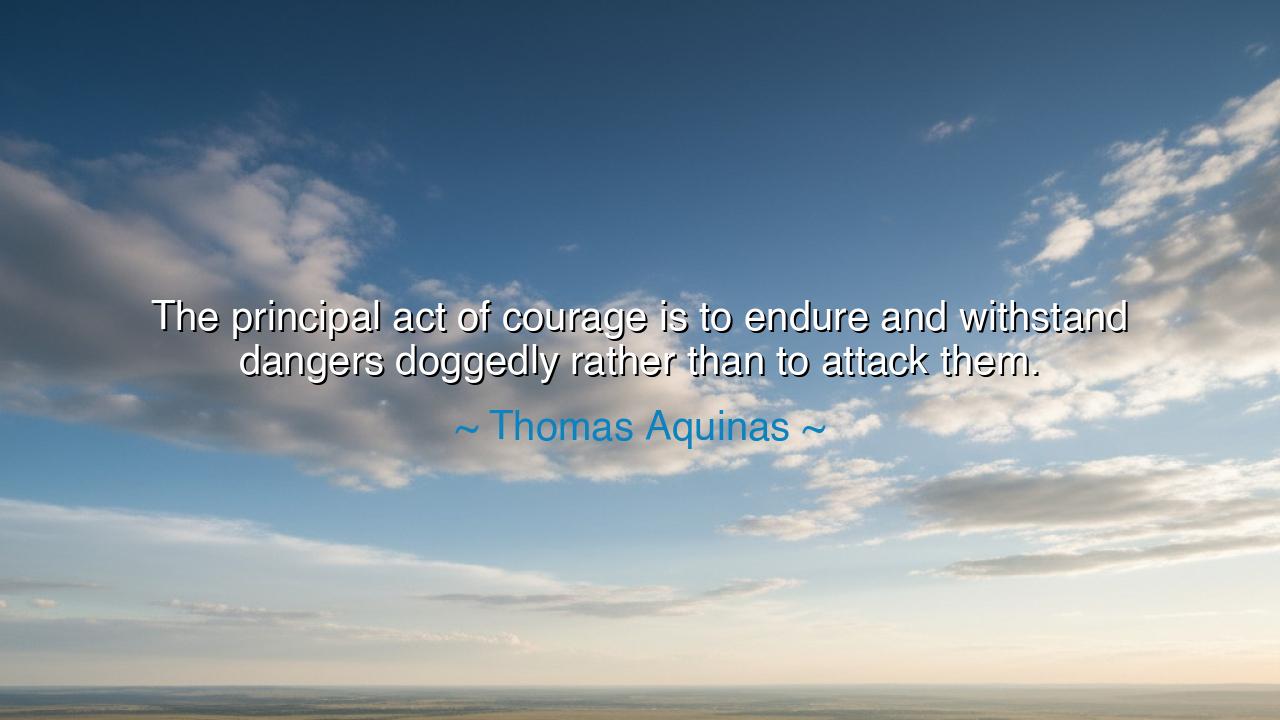
The principal act of courage is to endure and withstand dangers
The principal act of courage is to endure and withstand dangers doggedly rather than to attack them.






“The principal act of courage is to endure and withstand dangers doggedly rather than to attack them.” So wrote Thomas Aquinas, the Angelic Doctor, whose mind was as vast as the heavens he contemplated. In this single sentence, he unveils a truth often forgotten by those who mistake fury for bravery and action for strength. Aquinas reminds us that true courage does not always rush forward with sword in hand—it often stands firm in the storm, unmoving and unyielding. For it is one thing to strike in a moment of passion, but quite another to endure in the long shadow of danger, where patience and faith are tested more severely than strength of arm.
To endure is the highest form of valor, for it demands mastery over fear, over pain, and over the restless impulse to escape. The warrior who attacks may be driven by adrenaline, by rage, by the brief fire of defiance—but the soul that endures must find strength in silence, in weariness, in suffering that seems without end. Aquinas, steeped in the wisdom of Aristotle and the light of divine revelation, saw courage not merely as a reaction to peril, but as a habit of the soul—a steady flame that burns without wavering even as the winds of despair blow upon it. Such courage belongs not only to the battlefield, but to the heart that endures grief, injustice, and loss without breaking.
This understanding of courage was born in an age of both war and contemplation. Aquinas lived in the thirteenth century, when knights fought for glory and faith, yet he saw that the greater battle was often inward. The courage of endurance is not adorned with banners or songs—it is quiet, steadfast, and unseen. It is the courage of those who continue when all seems lost, who hold their ground when retreat would be easier. In his Summa Theologica, Aquinas wrote that “endurance is more difficult than aggression, for endurance implies a long and continuous struggle against fear.” To endure is to walk with courage through time itself, while attack is but a moment’s burst of strength.
Consider the example of Mahatma Gandhi, who faced an empire not with arms, but with patience. His weapon was not the sword, but the strength to withstand oppression without surrendering to hatred. Many mistook his nonviolence for weakness, but in truth, it was the purest courage—the courage to suffer without yielding, to fight injustice through steadfast endurance. The soldier who strikes once may end a battle; the soul that endures oppression without malice transforms the world. Gandhi, like Aquinas, understood that to withstand evil without becoming evil is the highest act of bravery.
The same courage lives in those who endure their own unseen trials: the mother who bears the weight of hardship for her children; the patient who faces illness with faith; the laborer who toils day after day, refusing to give in to despair. These are the unsung heroes of endurance, the quiet pillars of human strength. They do not march under banners, yet their perseverance sustains the world. To endure doggedly, as Aquinas says, is not to be passive—it is to resist destruction through steadfast will, to turn suffering itself into a forge that tempers the soul.
Yet this kind of courage is the most difficult to cultivate, for it requires humility. To attack is to assert power, but to endure is to surrender the illusion of control. It asks of us to trust—to believe that meaning can exist even in suffering. The coward flees from pain; the fool rushes headlong into it; but the wise endure, knowing that time and faith will reveal purpose where now there seems only trial. Aquinas, who found harmony between reason and faith, knew that courage of endurance is not born of pride, but of virtue—a strength drawn from something greater than oneself.
So let this teaching be passed on to the generations: Do not mistake noise for strength or haste for bravery. When danger surrounds you, when pain presses upon your heart, remember the wisdom of Thomas Aquinas—that the truest act of courage is not always to strike, but to stand. Endure faithfully, and let your endurance be filled with purpose. Whether in the battlefield of life, the trials of faith, or the quiet sufferings of the soul, hold your ground with dignity and resolve. For the one who can withstand danger doggedly, who can persevere when all hope seems lost, has achieved the most heroic act of all—the victory of the spirit over fear.






AAdministratorAdministrator
Welcome, honored guests. Please leave a comment, we will respond soon